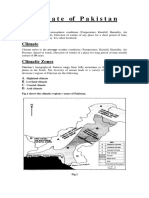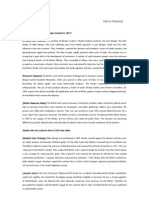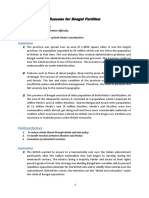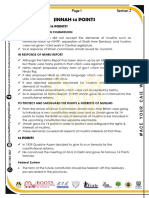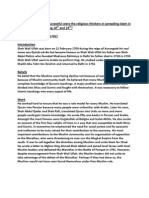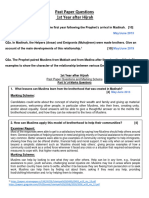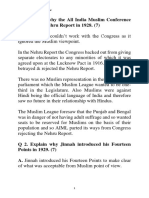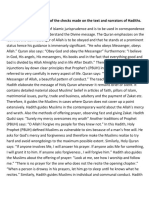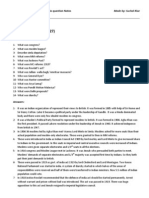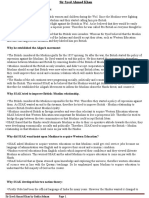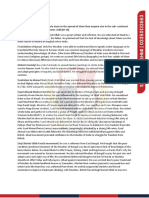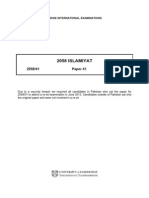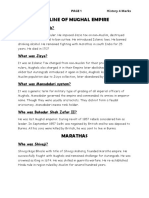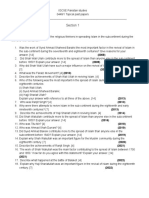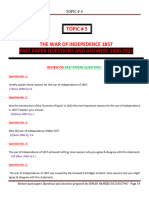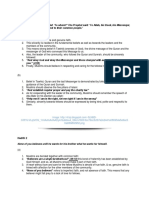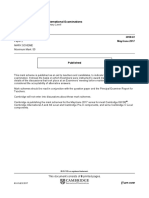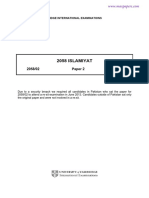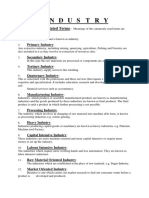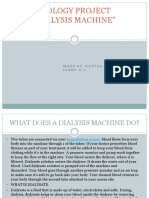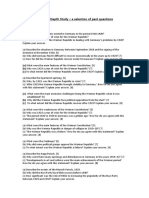2058 s16 Ms 21
2058 s16 Ms 21
Uploaded by
Rayyan MalikCopyright:
Available Formats
2058 s16 Ms 21
2058 s16 Ms 21
Uploaded by
Rayyan MalikOriginal Title
Copyright
Available Formats
Share this document
Did you find this document useful?
Is this content inappropriate?
Copyright:
Available Formats
2058 s16 Ms 21
2058 s16 Ms 21
Uploaded by
Rayyan MalikCopyright:
Available Formats
Cambridge International Examinations
Cambridge Ordinary Level
ISLAMIYAT 2058/21
Paper 2 May/June 2016
MARK SCHEME
Maximum Mark: 50
Published
This mark scheme is published as an aid to teachers and candidates, to indicate the requirements of the
examination. It shows the basis on which Examiners were instructed to award marks. It does not indicate the
details of the discussions that took place at an Examiners’ meeting before marking began, which would have
considered the acceptability of alternative answers.
Mark schemes should be read in conjunction with the question paper and the Principal Examiner Report for
Teachers.
Cambridge will not enter into discussions about these mark schemes.
Cambridge is publishing the mark schemes for the May/June 2016 series for most Cambridge IGCSE®,
Cambridge International A and AS Level components and some Cambridge O Level components.
® IGCSE is the registered trademark of Cambridge International Examinations.
This document consists of 6 printed pages.
© UCLES 2016 [Turn over
Page 2 Mark Scheme Syllabus Paper
Cambridge O Level – May/June 2016 2058 21
You must answer Question 1, Question 2 and two other questions.
1 Choose any two of the following Hadiths, and:
(a) describe their teachings about what Muslims believe; [4]
(b) explain how Muslims can put these teachings into action. [4]
Hadith 6
(i) Whosoever of you sees an evil action, let him change it with his hand, and if he is unable
to do so then with his tongue, and if he is unable to do so then with his heart, and that is
the weakest of faith.
Hadith 1
(ii) ‘Religion is sincerity.’ We said: ‘To whom?’ The Prophet said: ‘To Allah, his book, his
Messenger, the leaders of the Muslims and to their common people.’
Hadith 19
(iii) The world is a believer’s prison and the unbeliever’s paradise.
Hadith 5
(iv) Every person’s every joint must perform a charity every day the sun comes up: to act
justly between two people is a charity; to help a man with his mount, lifting him onto it or
hoisting up his belongings onto it is a charity; a good word is a charity; every step you
take to prayers is a charity; and removing a harmful thing from the road is a charity.
(a) (i) The main teaching of this hadith is that Muslims must never allow evil to take place in
any circumstance and if they see it happening they must do all that is in their power to
stop it. If they are unable to do so for whatever reasons, they must speak out against it
but never condone it and always deem it as an injustice. Some candidates may well
highlight in their answer that once a person declares they are a Muslim they have to
verify their faith through actions.
(ii) The important teaching of this hadith is that Muslims must sincerely follow the teachings
of Islam. Answers could be developed by candidates giving an insight into the elements
of the hadith by saying that Muslims need to put their belief into action by sincerely
following the five Pillars of Islam whilst being sensitive to the needs of other believers,
and that they need to be loyal members of their community by trying to better the lot of
those around them.
(iii) This hadith is related to individual conduct and draws attention to how true believers
resist the temptations of this world and endeavour to follow the righteous path, even if it
is not the easy one. Reference to this world being an unbeliever’s paradise could be
explained by the candidates by perhaps saying that those who do not believe in the one
God or the Day of Judgment live for the present without fear of accountability, so may
not live a life prescribed by God.
(iv) Social responsibility is the core teaching of this hadith. Muslims should care for the
needs of others around them and everyday acts of kindness carry the reward of charity.
© Cambridge International Examinations 2016
Page 3 Mark Scheme Syllabus Paper
Cambridge O Level – May/June 2016 2058 21
Good answers will highlight the fact that charity does not only refer to giving financial aid
to a needy person, but concern for fellow beings at all times is also deemed as charity.
(b) (i) Muslims must resist/fight evil however they can, with their hands, wealth, voice or
thoughts. The fight against evil involves many methods and must never cease, and a
Muslim must use every available just means to stop it. Examples could be given to
develop the candidate’s response.
(ii) Here candidates could say that by following the teachings of Islam, Muslims can put into
practice the teachings of this hadith. Answers could state that a good Muslim not only
obeys the commands of the Qur’an and the Prophet but also works to maintain the good
of the community and society at large. Examples of how this could be done could well be
given to support the answer.
(iii) By following the path prescribed by God and His Prophet (pbuh) and remembering one’s
accountability before God and thus walking on the path of righteousness is one way of
putting the teaching of this hadith into action. Candidates could give examples of
resisting temptations from the Prophet’s life, e.g. when the Makkans offered him wealth
and the hand of the fairest maiden in return for not preaching Islam, he refused.
Examples from their own lives in response to this answer could also be given. All valid
answers should be credited.
(iv) In response to this part of the question, a range of answers could be given to show how
the teachings of this hadith could be put into action. From enquiring after someone’s
health, to speaking a word of kindness to someone, to giving good and honest advice
when one’s opinion is sought, etc.
2 (a) What is the role of Hadiths as a source of guidance in the lives of Muslims? [10]
In answer to this question, candidates could state a whole range of reasons as to why
hadiths play a very important role in the lives of Muslims and are a source of guidance to
them in all aspects of life. What the Prophet (pbuh) said, did and what he approved of is
second in importance to the Qur’an; God has Himself told Muslims in the Qur’an ‘Obey Allah
and obey the Prophet’ [64:12]; Prophet (pbuh) said, ‘I leave with you two things. If you hold
fast to them both you will never be misguided: the Book of Allah and my sunna.’ Hadiths are
important to explain the teachings of the Qur’an; details of hajj, zakat, fasting are all given to
Muslims from the hadith and sunna of the Prophet (pbuh); the Prophet (pbuh) laid down
principles (shariah) regarding every aspect of life: buying, selling, contracts, inheritance
which are all part of his sunna; in the Farewell Address he clearly stated: ‘He who is present
here shall carry this message to the one who is absent.’ Muslims turn to his actions to
emulate him in the hope that their actions will please the Almighty and be acceptable to him.
(b) How are Muslims obeying God when they obey the Prophet? [4]
In this part of the answer, an evaluative response needs to be given and candidates can
write a response to it in many different ways. One way of answering this question could be
that by following the Prophet’s (pbuh) example, for instance in how to perform salat, Muslims
are not only following his instruction but also fulfilling their obligation to God by completing
the second Pillar of Islam. So in this way they are obeying both the Prophet (pbuh) and God.
All valid answers need to be credited.
© Cambridge International Examinations 2016
Page 4 Mark Scheme Syllabus Paper
Cambridge O Level – May/June 2016 2058 21
3 (a) The conquest of Persia was one of ‘Umar’s great achievements. Write an account of
any two battles fought with the Persians during his caliphate. [10]
In answer to this question, candidates need to name any two of the battles that were fought
against the Persians during ‘Umar’s term as caliph and give a detailed account of them.
Giving dates, names of generals, other relevant details and outcomes of the battles will help
gain higher levels. Brief notes are given below on the battles.
Battle of Namrak:
The Persians were furious at the fall of Hira. They sent a large army under Rustum.
Muthanna bin Harith asked the caliph for reinforcements and the battle of Namrak was fought
by Muthanna and Khalid bin Waleed in 634. The Persians were defeated.
Battle of Jasr (Bridge):
Rustum assembled a huge army at the bank of the Euphrates. The Muslims crossed the
bridge under the command of Abu ‘Ubaid ath-Thaqafi in 634. Fierce fighting broke out; Abu
Ubaida was martyred and the Muslims were in chaos. Someone cut the bridge to encourage
them to fight but it had the opposite effect. The Muslims lost the battle.
Battle of Buwaib:
Shocked at the defeat, ‘Umar sent reinforcements to Muthanna’s army. A large Persian force
of 200 000 men under Mehran met the Muslim army at Buwaib; a fierce battle was fought, the
Persian commander was killed and 100 000 of their men lost their lives. The battle was won
by the Muslims.
Battle of Qadisiya:
The Persian emperor Yezdgird assembled a large force under Rustum. The Muslim army
was led by Sa’d bin Abi Waqas who offered the Persians three options: accept Islam, pay
jizya or fight. They opted to fight. A fierce battle was fought in 637. The battle lasted for three
days and a Muslim force of 28 000 men defeated a Persian force of 120 000. Rustum was
killed in this battle and the Persians were defeated. After Qadisiya, Sa’d, with the permission
of the Khalifa, occupied Madain, bringing the whole territory from the Euphrates to the Tigris
under the banner of Islam. Again, Sa’d’s army met the Persians at Jalula and defeated them.
Battle of Nahawand:
After the surrender of Jalula, there was peace for some time but then the Persians united
against the Muslims. They were 60 000 in number and the Muslim forces were 30 000. Both
armies met at Nahawand and there was a fierce battle for two days. On the third day, the
Persians took refuge in the forts but by using a clever strategy the Muslims got them out and
defeated them. Thus, in 642 the Persians were completely defeated at Nahawand.
The above notes are brief for the reference of examiners; candidates need to give fuller
accounts of the two battles they choose to write about.
© Cambridge International Examinations 2016
Page 5 Mark Scheme Syllabus Paper
Cambridge O Level – May/June 2016 2058 21
(b) Say which in your opinion was the most significant of the battles fought under ‘Umar
against the Persians and why. [4]
The candidates need to choose any one battle that was fought against the Persians. The
battle they choose to write about does not necessarily have to be from the two they have
written about in part (a). They do, however, have to say why in their view the one they have
chosen to write about was the most important one fought between the Persians and the
Muslims. Evaluation is what is being looked for and here candidates could write about the
effects of the battle after it was over or perhaps compare it to other battles.
4 (a) (i) Outline the main teachings in the Qur’an and Prophetic Hadiths about prayer
(salat) as the foundation of Islam.
(ii) Describe how Muslims prepare themselves for prayer. [10]
In answering the first part of the question, candidates could give a host of reasons as to
what makes salat the foundation of Islam. They could say that it is the second most
important Pillar of Islam, that it has to be performed by all Muslims five times a day and
that it is the first act of worship that was made obligatory by God. In many verses of the
Qur’an God follows up prayer with remembrance of God, ‘Lo! Worship preserves (one)
from lewdness and iniquity, but verily, remembrance of Allah is more important’ (Al-
Ankabut 29:45). Again, in An Nisa 4:103 God says, ‘prayer at fixed hours has been
enjoined upon the believers’. Such is its importance that the Prophet (pbuh) has said
that the dividing line between belief and disbelief is salat. It gives structure to a day
enabling Muslims to remember God and marks the whole day with a spiritual stamp. It
strengthens belief in God and gives spiritual strength to a Muslim to better themselves. It
purifies the heart, gives a Muslim a chance to thank their Creator for all the blessings
granted to them, provides inner peace and is said to be the key to paradise.
In answering the second part of this question, it could be said that the place of prayer
should be clean, clothes need to be clean, sattar needs to be observed, wudu/tayyamum
needs to be done, qibla needs to be faced, wait for azan, declare the niyyah, etc.
Once again, the mark is not divided but the answer needs to be read as a whole.
(b) Why should meeting for congregational prayers be more advantageous than
performing prayer alone? [4]
The Prophet (pbuh) has said: ‘Prayer in congregation is better than the prayer of a man by
himself by twenty seven times’ (Agreed). Candidates could go on to say that it is in the sunna
of the Prophet (pbuh) to pray in congregation, that it promotes brotherhood, equality and
unity amongst Muslims. It gives Muslims a chance to meet other Muslims and perhaps be
able to help those who are in need, etc. and hence has a lot of social importance. On a more
personal level it could be said that it requires more effort to leave what one is doing to get to
the mosque in time for the salat. All valid answers must be credited and it is the degree of
evaluation in them that will take the mark to the higher level.
© Cambridge International Examinations 2016
Page 6 Mark Scheme Syllabus Paper
Cambridge O Level – May/June 2016 2058 21
5 (a) Muslims believe that God alone is Lord, that He alone should be worshipped and that
His names and attributes are unique to Him. Outline Muslim beliefs in the oneness of
God. [10]
Muslims believe in one God, Allah. This belief in the oneness of God is known as tawhid.
This belief is the core of Islam and all creation has to recognise the Creator, which is God,
and submit to his will. Tawhid has three aspects: Oneness of the Lordship of God; Oneness
in Worship of God; and Oneness in the names and qualities of God.
In this answer, candidates need to name these three aspects of Tawhid and explain them:
Oneness of the Lordship of God:
There is only one Lord for the entire universe, that is God. He is the Creator, Sustainer, Law-
giver and Master of the universe. He is neither the father nor the son of anyone. The main
statement that every Muslim makes is ‘la ilaha illa Allah’, ‘there is no God but Allah’.
Candidates could give quotes from the Qur’an to expand on this aspect of tawhid.
Oneness in Worship of God:
Since God is the Creator, he is the only one worthy of worship. It is man’s primary duty and
obligation to worship none other than him. Muslims must only pray, invoke, and ask him for
help. ‘You alone we worship and You alone we ask help from.’ (Ikhlas 112:2-3)
Oneness in the Names and Qualities of God:
The belief includes:
We must not name or qualify God except with what he and his Messenger have named or
qualified him with.
None can be named or qualified with the names or qualifications of God.
Muslims must believe in all the qualities of God which he has stated in his Book or mentioned
through his Messenger; Muslims believe in the divine attributes of God; these attributes are
only inherent in God and this belief is integral to Islam. Muslims are unable to describe God;
however, the existence of God can be realised through his manifestations and through his
attributes as told by his messengers. Again, candidates can quote from the Qur’an to
develop the point further.
(b) Why has God repeatedly warned Muslims against committing shirk? [4]
An evaluative and personal response is needed to answer this question. It could be said that
God has warned Muslims against committing shirk as it signifies ascribing partners to him or
suggesting that another could share his divine attributes. It has been termed as the most
unforgivable of sins for which one will not be forgiven by God.
© Cambridge International Examinations 2016
You might also like
- History Topical 2004-2017Document144 pagesHistory Topical 2004-2017umerNo ratings yet
- Climate of PakistanDocument23 pagesClimate of PakistanRayyan MalikNo ratings yet
- Pakistan Studies (History) CompleteDocument12 pagesPakistan Studies (History) CompleteHarris Masood100% (2)
- Hadith 1-20Document19 pagesHadith 1-20Hummayal TariqNo ratings yet
- Section 2 PP HISTORYDocument116 pagesSection 2 PP HISTORYminha aliNo ratings yet
- Reasons For Bengal Partition-Merged-MergedDocument33 pagesReasons For Bengal Partition-Merged-MergedJustice LeaugeNo ratings yet
- Hadis 1-20Document20 pagesHadis 1-20Niaz ShaikhNo ratings yet
- Jinnah 14 Points Notes and Solved Past Papers 2023-24Document7 pagesJinnah 14 Points Notes and Solved Past Papers 2023-24techno gmaez100% (1)
- Important History 2023 GuessDocument1 pageImportant History 2023 GuessGhulam Mehar Ali ShahNo ratings yet
- Topic 12, Sec 2THE ROUND TABLE CONFERENCESDocument6 pagesTopic 12, Sec 2THE ROUND TABLE CONFERENCESJamal Ahmed0% (1)
- Week 06 Day 03 P1 2022Document8 pagesWeek 06 Day 03 P1 2022muhammad khanNo ratings yet
- Haji ShariatullahDocument1 pageHaji ShariatullahAmmar RizwanNo ratings yet
- Key Question 1 Religious ThinkersDocument6 pagesKey Question 1 Religious ThinkersSaarim Damani100% (2)
- Section 3 4marksDocument7 pagesSection 3 4marksOmer NaseemNo ratings yet
- Chap-2 Enter The British Notes (Questions)Document6 pagesChap-2 Enter The British Notes (Questions)Rahat RizwanNo ratings yet
- CAIE Topical Question BankDocument37 pagesCAIE Topical Question BankTayba AltafNo ratings yet
- Khilafat Movement's 14 Mark QuestionDocument2 pagesKhilafat Movement's 14 Mark QuestionMark100% (1)
- 4 MarksDocument33 pages4 MarksFareena AbroNo ratings yet
- Give An Account of The Tribes Living in Madina and The Details of The Constitution of Madina That Brought Them All TogetherDocument2 pagesGive An Account of The Tribes Living in Madina and The Details of The Constitution of Madina That Brought Them All TogetherSaima SyedNo ratings yet
- Past Paper QuestionsDocument10 pagesPast Paper QuestionsrayyanwassanNo ratings yet
- Sir Muzamil Notes o Levels Islamiat Paper 2Document10 pagesSir Muzamil Notes o Levels Islamiat Paper 2Muqeet QaiserNo ratings yet
- The War of Independence 1857 Students 3Document6 pagesThe War of Independence 1857 Students 3Omaima SattarNo ratings yet
- Compiled by Sana FatimaDocument9 pagesCompiled by Sana FatimaHassan WarisAli100% (1)
- Cambridge O Level: Second Language Urdu For Examination From 2024Document10 pagesCambridge O Level: Second Language Urdu For Examination From 2024iman 908No ratings yet
- Sanad and MatnDocument5 pagesSanad and MatnMohammad HasanNo ratings yet
- CH 3,4 HistoryDocument9 pagesCH 3,4 HistoryADIL DURRANI100% (1)
- Paper 1, Topical Questions BookletDocument35 pagesPaper 1, Topical Questions Bookletmahid kasiNo ratings yet
- Pak Studies o LevelsDocument2 pagesPak Studies o LevelsAleibaa Asad0% (2)
- Sir Syed Ahmed Khan NotesDocument3 pagesSir Syed Ahmed Khan NotesAbdul Hadi100% (1)
- 2058 s19 Ms 12Document16 pages2058 s19 Ms 12Asif NazeerNo ratings yet
- Compiled by Tahir Ali Babar: Paper 1 Islamiyat GCE O LEVEL & IGCSE Past Paper Questions May/June 2009 To Oct/Nov2019Document18 pagesCompiled by Tahir Ali Babar: Paper 1 Islamiyat GCE O LEVEL & IGCSE Past Paper Questions May/June 2009 To Oct/Nov2019Justice LeaugeNo ratings yet
- Expansion of Muslim Empire During The Caliphate of Abu BakrDocument1 pageExpansion of Muslim Empire During The Caliphate of Abu BakrdisyNo ratings yet
- NOTES CLASS 9 Chapter 1-5 (SECTION 1)Document43 pagesNOTES CLASS 9 Chapter 1-5 (SECTION 1)Benazir SheikhNo ratings yet
- Quranic Verses: Answers in Accordance With The Recent Change in Part (B) of Question 1Document17 pagesQuranic Verses: Answers in Accordance With The Recent Change in Part (B) of Question 1Haseeb DurraniNo ratings yet
- Section 1 Notes by Sir Fahad Hameed PDFDocument20 pagesSection 1 Notes by Sir Fahad Hameed PDFIraj Aziz100% (1)
- Unit 6.mineralsDocument7 pagesUnit 6.mineralsBurhanNo ratings yet
- Passages and Major ThemesDocument10 pagesPassages and Major ThemesAiman Imran100% (1)
- Sir Salman Hashmi - CIE TUTORS - 03350133663Document51 pagesSir Salman Hashmi - CIE TUTORS - 03350133663MariaNo ratings yet
- Classification of HadithDocument4 pagesClassification of Hadithdifferent person0% (1)
- The Fishing Industry in Pakistan: How Can Subsistence Fishing Methods Be Improved?Document8 pagesThe Fishing Industry in Pakistan: How Can Subsistence Fishing Methods Be Improved?Piper McleanNo ratings yet
- S.H.Bari Islamiyat Workshop 2023 7QsDocument14 pagesS.H.Bari Islamiyat Workshop 2023 7QsGhulam Mehar Ali ShahNo ratings yet
- 2058 s13 Ms 41Document6 pages2058 s13 Ms 41mstudy123456No ratings yet
- Ahadith 6-10 Updated NotesDocument6 pagesAhadith 6-10 Updated Noteshania aijazNo ratings yet
- 4 Marks QuestionsDocument33 pages4 Marks QuestionsyousufsonsNo ratings yet
- History Past PapersDocument75 pagesHistory Past PapersILikeCats 23No ratings yet
- Shah WaliullahDocument6 pagesShah WaliullahLouis's WifeNo ratings yet
- Q Did Shah Waliullah Contribute More To The Spread of Islam Than Anyone Else in The SubDocument25 pagesQ Did Shah Waliullah Contribute More To The Spread of Islam Than Anyone Else in The SubKhatidja AllyNo ratings yet
- Surahs 1,3,5,6,7,8Document5 pagesSurahs 1,3,5,6,7,8Al :'DNo ratings yet
- Olevel 2Document23 pagesOlevel 2Syed Muhammad Saleem FeroziNo ratings yet
- Section 3-Questions For PracticeDocument5 pagesSection 3-Questions For PracticeNashrahNo ratings yet
- Battle of TrenchDocument2 pagesBattle of Trenchonaiza butt100% (1)
- Topic 5 Woi PPDocument25 pagesTopic 5 Woi PPminha aliNo ratings yet
- Quranic Passages 1Document6 pagesQuranic Passages 1Iftikhar AhmedNo ratings yet
- Hadith 1-20Document15 pagesHadith 1-20Casino callNo ratings yet
- Cambridge International Examinations Cambridge International General Certificate of Secondary EducationDocument6 pagesCambridge International Examinations Cambridge International General Certificate of Secondary EducationSaima SyedNo ratings yet
- 2058 s17 Ms 22Document8 pages2058 s17 Ms 22Saad ArsalanNo ratings yet
- 2058 s13 Ms 2 PDFDocument6 pages2058 s13 Ms 2 PDFIlsa Marium ChaudharyNo ratings yet
- 2058 s17 Ms 21Document8 pages2058 s17 Ms 21Saad ArsalanNo ratings yet
- 2058 s16 Ms 22 PDFDocument6 pages2058 s16 Ms 22 PDFzeeshan100% (1)
- 0493 s17 Ms 22Document8 pages0493 s17 Ms 22Shamvil RazaNo ratings yet
- Cambridge Assessment International Education: Islamiyat 0493/21 October/November 2019Document7 pagesCambridge Assessment International Education: Islamiyat 0493/21 October/November 2019Mohsan MinhasNo ratings yet
- Nexus Math SocietyDocument1 pageNexus Math SocietyRayyan MalikNo ratings yet
- 2059 w14 Ms 1Document11 pages2059 w14 Ms 1Rayyan MalikNo ratings yet
- Large Industry PDFDocument27 pagesLarge Industry PDFblack snipersNo ratings yet
- 1.3.3 1.3.4 1.3.5 Input, Output & Storage Devices Workbook by Inqilab Patel PDFDocument173 pages1.3.3 1.3.4 1.3.5 Input, Output & Storage Devices Workbook by Inqilab Patel PDFRayyan MalikNo ratings yet
- Biology ProjectDocument7 pagesBiology ProjectRayyan Malik0% (1)
- Germany Questions by ThemeDocument5 pagesGermany Questions by ThemeRayyan MalikNo ratings yet

